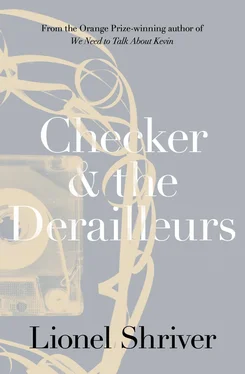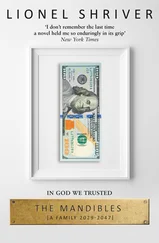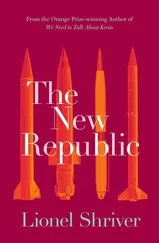“Yeah, well,” said Brinkley. “I said he was okay, right?”
“Okay!” Eaton rolled his eyes and stood up. “With this crowd I need drink.” He walked away and didn’t come back.
“That was exemplary.”
Plato’s may never have heard the word “exemplary” before; its syllables queered against the walls.
“I was humbled,” Eaton went on, bent formally at the waist, as if he’d watched too much Masterpiece Theatre. “You’re a giant. And far better than these people know.”
“I think they know us just fine,” said Checker, looking disconcerted. Compliments made him queasy. Checker himself didn’t think about the way he played. He didn’t want to, either.
“You’re better than you know,” Eaton pressed. “It’s time someone told you. So, please.” Eaton handed Checker his card. “I know the names of some club owners in Manhattan. Or if you need anything at all, please call. Good night, all.” With a quick flourish Eaton made a swift departure. After all, he wasn’t sure how much longer he could keep this up.
In the defined caste of high school, Eaton Striker had played a precise role, exactly shy of stardom. He passed that crucial test: more students knew his name than he knew theirs. He was The Drummer, and relished sitting in the cafeteria with a drumstick stuck behind his ear, ticking paradiddles on his tray with silverware. Yet while his traps and his rock bands saved him from obscurity, they didn’t secure him quite the premier position he felt he deserved. There was always one more table next to his where every student yearned to sit, and they’d settle for Eaton’s only when the first was full.
In every area Eaton was plagued with not-quiteness. There was a particular lancet-witted brunette, Stephanie, whose quips in his direction prickled his skin like the sting of a slap, but that was all the tribute he could win from her; on the other hand, Stephanie’s slightly less attractive, slightly less sharp best friend showed up for every one of Eaton’s early gigs. Now, he did finally acquiesce and take Charlotte as his girlfriend, enjoying the pleasant lopsidedness of the relationship—she typed his papers and packed his drums and ruined a perfectly good denim jacket with embroidery as a “surprise.” All he had to do in return was treat her badly, for which Eaton seemed to have been born with a certain gift. But seeing Charlotte with first prize was torture. Eaton was dating the kewpie doll while someone else was wrapped around the big stuffed bear.
All second prizes are insults. Eaton believed that. When in the senior talent show his band, Nuclear War, was awarded second place, Eaton strode from the stage and in front of the whole assembly stuffed the certificate perfunctorily in a trash can. When Eaton’s cronies nominated him for student council office, it was for vice president; he lost to a girl.
Even Eaton’s grades were never perfectly straight-A. There was always one teacher who had it in for him in one of those mealy subjects—English, social studies—where the teacher’s feeble judgment came into play. Eaton preferred math—his work was right or wrong, whether or not the instructor despised him. For while Eaton was never directly insolent, his sly, grimly bemused expression nagged his teachers like a persistent hangnail. Whenever they talked to him after class he turned his head to watch them out of the corners of his eyes, his responses laconic; he always seemed to indicate that a great deal was being left unsaid. On any point of conflict his teachers quickly abandoned personal appeals and fell back on brisk legalistic resolutions.
These were uneasy relationships. Eaton’s intelligence would never redound to his teachers’ glory. Rather, each would shine at the expense of the other. That was the stanchion of Eaton’s world view, and it was contagious.
So Eaton was the hero of the B+ students, revered by the type in elementary school picked third or fourth for a kickball team of ten. Burdened by Eaton’s disappointment, his following had a high turnover; his rock bands were always breaking up. At the moment, out of school over half a year now, Eaton was once more without a band, and it was harder to assemble a new one without high school; he paged through the ads in the SoHo News listlessly on Saturday afternoons. Eaton yearned for caliber. The idea of collecting one more second-rate rock band filled him with a precocious exhaustion.
That Eaton would end up at Plato’s was inevitable. By January he had been actively avoiding the place, spending Friday nights instead at Billy’s Pub, Grecian Gardens, Taverna 27, bars that never managed to persuade you they were anything more than rooms with bottles, full of bowlers and plumbers all too eager to confide the trials of the kind of life Eaton planned to transcend. Yet even Taverna 27 was better than the chromier corners, decorated like Alexander’s at Christmas and cranking out Van Halen on the juke, cramped with high-school juniors constantly combing their hair. Eaton was only nineteen, but he’d said goodbye to all that.
There was always Manhattan, but Eaton hated coming back at four in the morning on the subway with all the plebes who couldn’t afford a car. Eaton couldn’t afford a car, either, but he was the kind of person who really should have been able to, and a pretty damned nice car at that. (Eaton’s sense of justice was frequently confounded. Eaton should have X and Eaton did have Y, and the disparity didn’t anger him exactly—his reaction was deeper than that. It disturbed him. When Eaton didn’t get what he deserved, he felt the earth—move—under his feet—Carole King. Yich.) In the city, scrunched against the bar with his friends, Eaton would slip the straw of his screwdriver between a gap in his teeth, having to repeat three times over the music how these clubs were “tedious,” though he privately considered them far more evil than that—the heaving, shifting mass of dancers would undulate and suck against him like some lowlife sea creature, swallowing him in anonymity, digesting him alive and spitting his remains out the door at three, forty dollars poorer.
Furthermore, Eaton was underage, and though he usually cooled his way past the bouncer by paying the cover with an unusually large bill, Eaton craved legitimation. He hated being nineteen. He remembered with humiliation the other night at Van Dam’s, when the thirtyish man beside him had asked him, as a drummer, what did he think of “In-A-Gadda-Da-Vida”?
“Amusing, but finally bogus. I didn’t go along with the brouhaha over the album when it first came out.”
“Come on!” said the man. “It came out in ’68! You were listening to Iron Butterfly when you were one?”
Eaton couldn’t wait to turn thirty and do the same thing to kids sitting next to him. In the meantime, he listened to the radio with a pencil, and haunted the aisles of Tower Records like a law student in the stacks, studying jackets like torts, reading the fine print—dates, producers. He put together histories of who left what band and started this one, reading Rolling Stone cover to cover, determined never to be caught out by aging rock has-beens in Manhattan again.
Eaton yearned for a club where patrons knocked him on the shoulder and cleared room for him at the bar, where the waitresses knew him by name and remembered his liquor brands. Eaton liked to be recognized, and Astoria should have been the place for that; a small-towny Greek neighborhood in Queens with friendly shopkeepers and good-old-boy bars, Astoria would transplant easily to the middle of Iowa. Eaton’s failure to carve a niche even here was one more of those disconcerting challenges to his stature, for if he went to the same bar several nights running, Eaton would sure enough get recognized, but no one seemed very happy to see him.
Читать дальше












